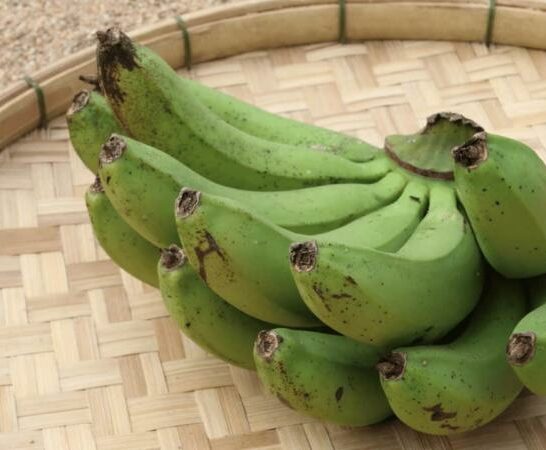I love buying bananas with my weekly groceries.
Well, when they are available, I mean.
I use the bananas to make banana bread, add it to toast or pancakes with Nutella and berries, make a yummy banana ice cream, and use it as a base for my smoothies.
Imagine how unhappy I was when the bananas I bought didn’t ripen.
Not even a hint of yellow on these unripe bananas after more than a week of them sitting on my kitchen counter.
Of course, I set off to investigate and find answers. I’ve also got some details on how you can help your bananas ripen if they aren’t ripening like mine was.
Why Aren’t Your Bananas Ripening?
Bananas are not ripening because of the banana variety you bought – some bananas don’t turn yellow when they are ripe and ready to be eaten. Other reasons that your bananas are staying unripe could be that premature bananas with a stunted growth process were harvested, your bananas completely suffocated as they need oxygen to ripen, or you placed the bananas in your fridge or another cold area in your home. They need warmer temperatures and humidity to be yellow.
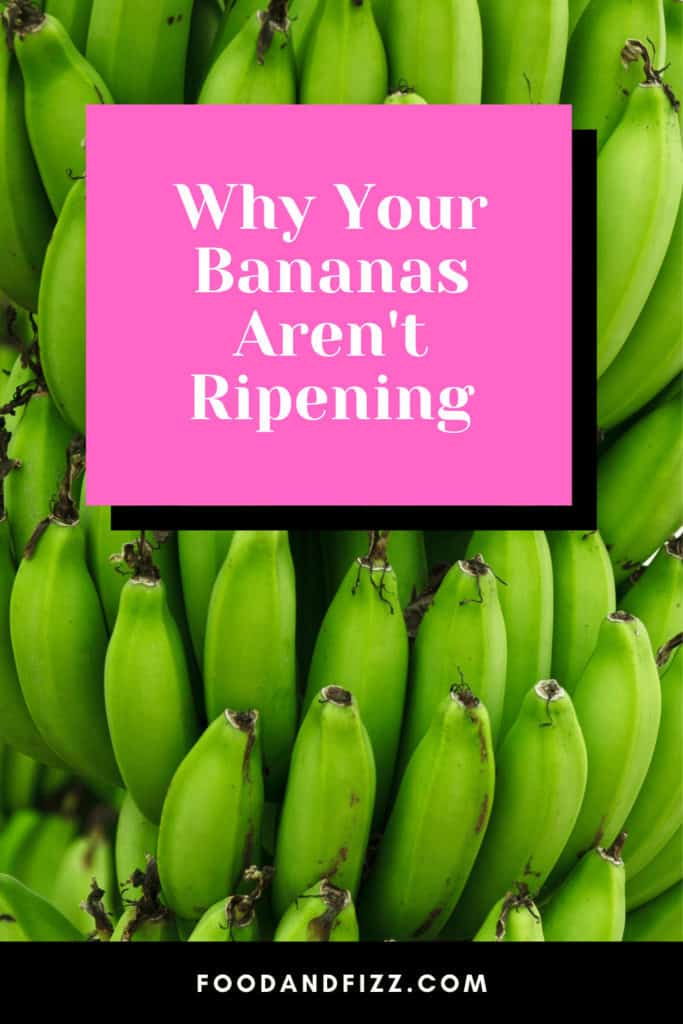
Organic bananas need to ripen by themselves, and they release ethylene gas slowly, while something may have gone wrong with the ripening process of non-organic bananas.
In that case, they need to be sprayed with synthetic ethylene gas and placed in a room at the right humidity level, and temperature after their ripening process was arrested.
Lastly, you may be too impatient as it takes, on average, 5-7 days for green bananas to ripen.
7 Reasons Why Unripe Bananas Won’t Ripen
Here are the reasons I found that some bananas don’t turn yellow or ripen:
Reason 1: The Banana Variety
Some banana varieties just never turn yellow when they are ripe.
In fact, they stay the color they are, which could be green, blue, or even red.
Plantains, also called green bananas, are cooking bananas.
Plantains are actually a starchy vegetable like a potato that’s a staple in Southeast Asia, Central Africa, West Africa, and the Caribbean.
The plantains will eventually turn a ripe banana yellow, but they are typically cooked before they are ripe.
Then there’s also the Ebun Musak banana variety that turns a light green when it’s ripe.
If you aren’t sure if the banana is ripe because it isn’t yellow, then you can gently press on the skin of the berry (bananas are berries, by the way).
If there is a little give and the banana is soft, it’s ripe.
You can also unpeel a banana and taste it to check if it’s ripe.
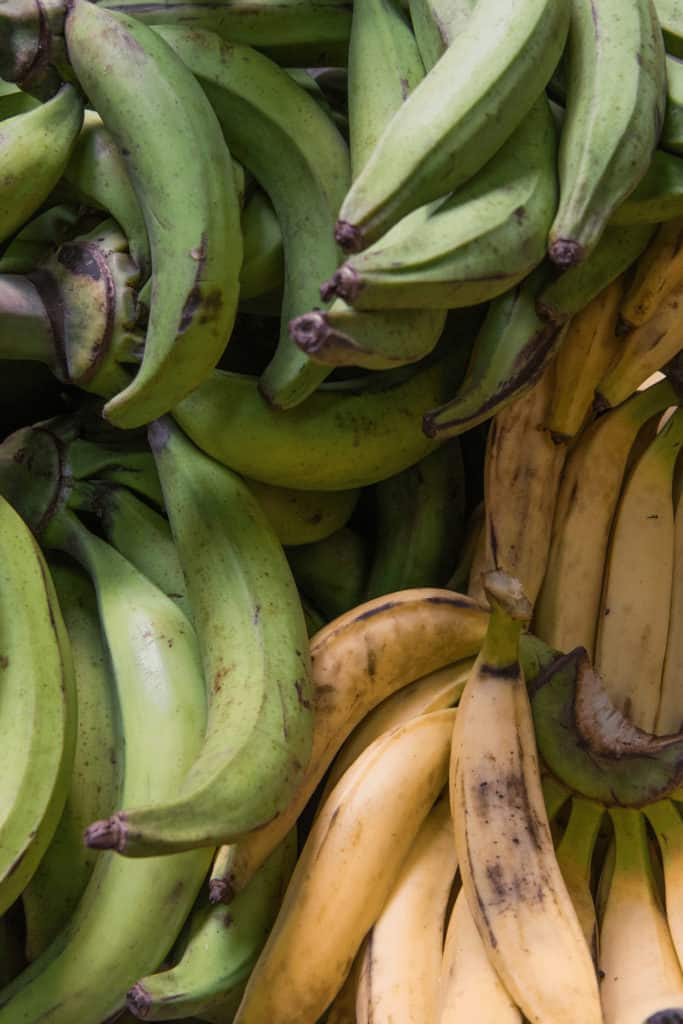
Reason 2: The Ripening Process Hasn’t Fully Re-Started
Bananas take too long to ripen if they are left on the banana trees. So they are harvested before they are ripe.
Plus, if companies had to transport these fruits fully ripened, it means that they will suffer huge financial losses because the bananas won’t ship well.
So after the bananas are harvested, they are packed and taken to refrigeration trucks, which stops the ripening process.
Bananas are climatic fruit, so they ripen even more after they are harvested from their modal plants.
But a lack of humidity and optimal temperature (aka the cold from the refrigeration) equals no ripening process.
When the bananas reach their destination, they are sprayed with synthetic ethylene gas to “reactivate” the ripening process.
The room the bananas are placed in is also at the right temperature and humidity the bananas need to restart their metabolic activities to ripen.
But anything can go wrong here.
The fruit may not get exposed to enough ethylene gas.
The room may not be at the right temperature or humidity level.
Thus, the bananas you buy may never ripen, or they may do so – very slowly – as they naturally produce ethylene gas, provided the humidity and temperature are right.
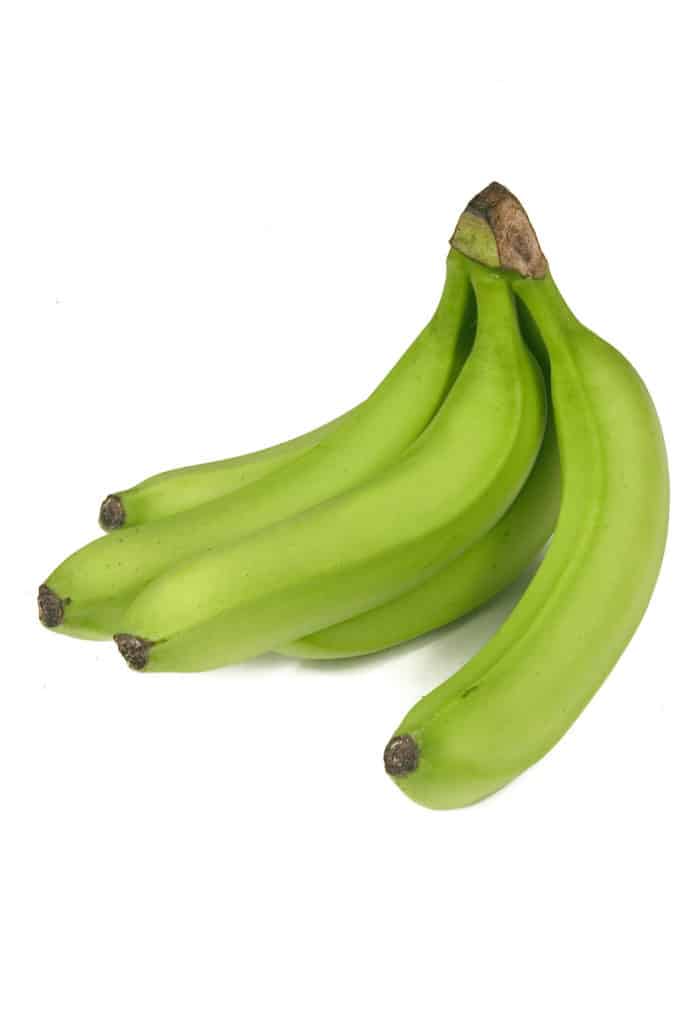
Reason 3: Organic Bananas
Organic bananas take longer to ripen than conventional bananas.
If bananas are grown the “traditional” way for mass manufacture, they are sprayed with chemicals that synthetically resemble ethylene, the gas that helps fruit ripen.
Bananas that are grown organically are not sprayed with anything synthetic or chemical.
Rather, they are left to ripen as nature intended – organically.
Thus, they mature slowly because bananas produce only a small amount of ethylene gas at a time.
Thus, it may seem like your organic bananas aren’t ripening, but they are just taking their sweet time getting there.
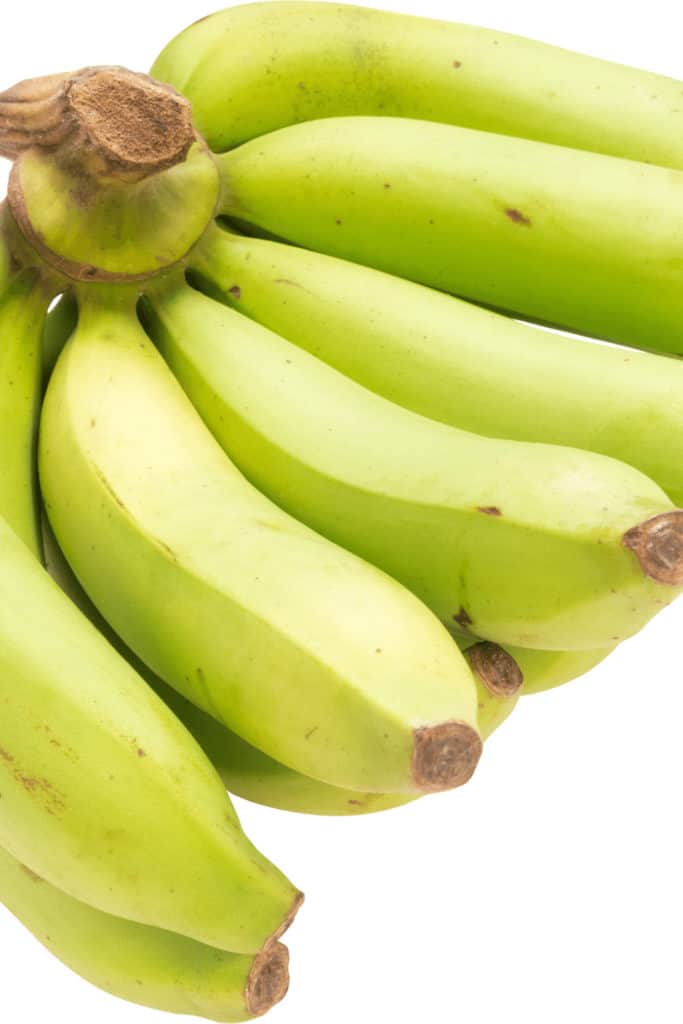
Reason 4: Premature Bananas
Premature bananas and green bananas may mean the same thing to you and me, but they don’t in the science world.
A green banana is physiologically mature to ripen and continue ripening even after being harvested.
A premature banana won’t easily ripen because of an incomplete growth process. If you have premature green bananas, they won’t be plump.
Rather, they’ll have edges. Also, they’ll likely sit on your kitchen counter, develop brown patches, and eventually rot because you are waiting for the banana to ripen – only it probably never will.
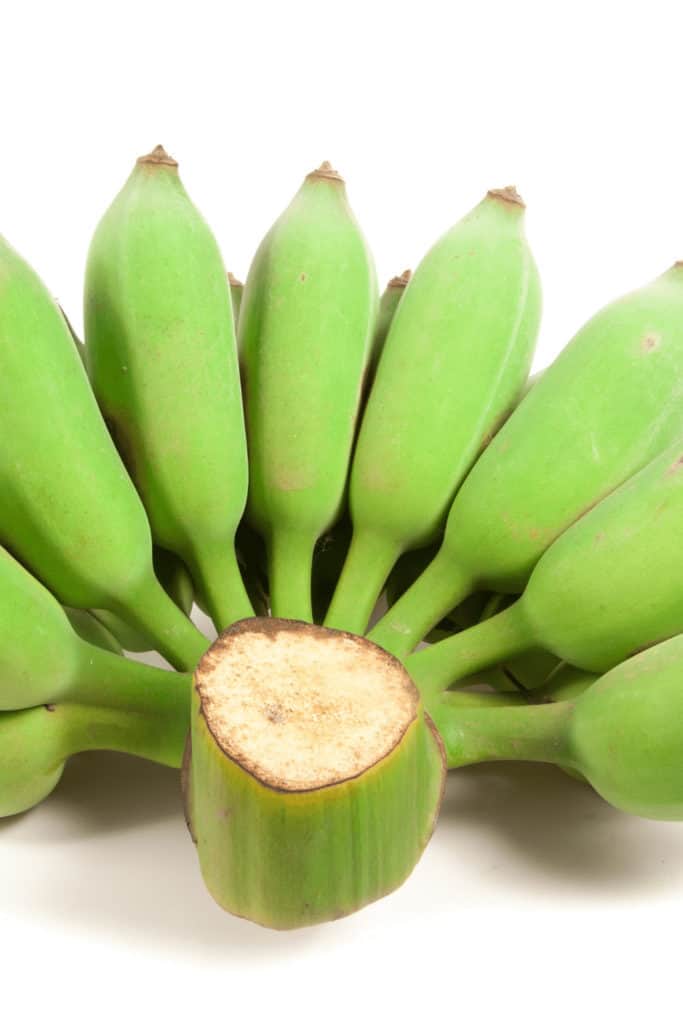
Reason 5: Cold Bananas
If you don’t want your bananas to ripen too quickly, putting them in the fridge or the coldest part of your house is a good way to slow down the ripening process.
But if you didn’t know this, like me, and you placed your bananas in your pantry, they will take a while to ripen because the cold deactivates the metabolic process that degrades cells, turning fruit ripe, soft, and sweet.
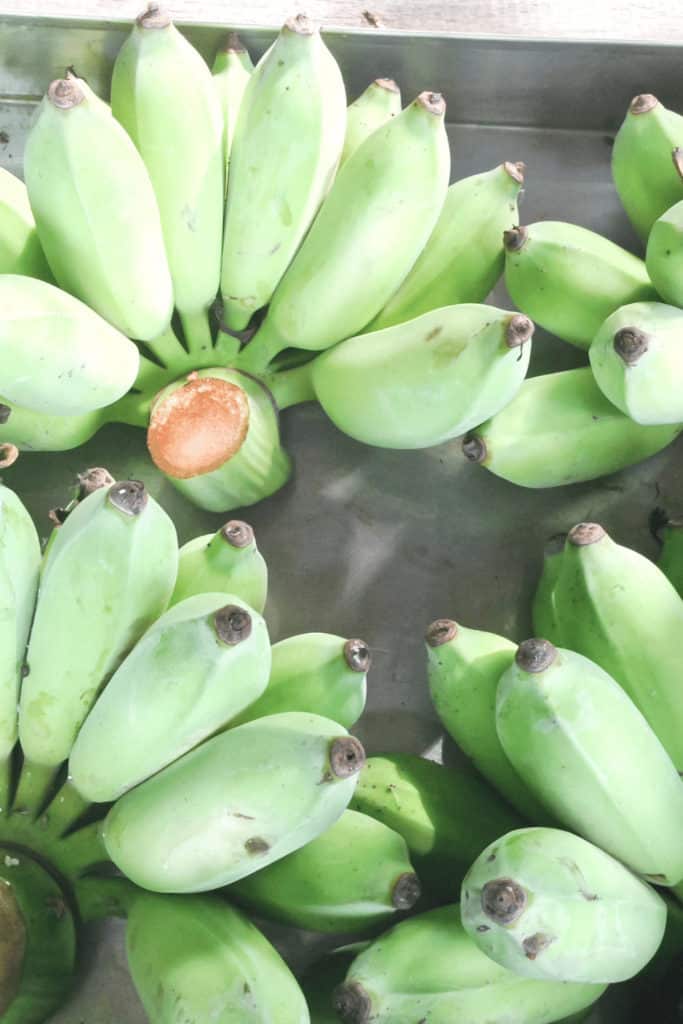
Reason 6: Suffocation
Bananas that are suffocating won’t ripen or turn yellow. If the fruit is wrapped in the vacuum-packed packet you bought them in or any other kind of wrapping, it may be deprived of oxygen.
Oxygen is needed so bananas can produce ethylene and so they can turn yellow or ripen.
Ensure your bananas aren’t oxygen-deprived by keeping them in a fruit bowl on your kitchen counter.
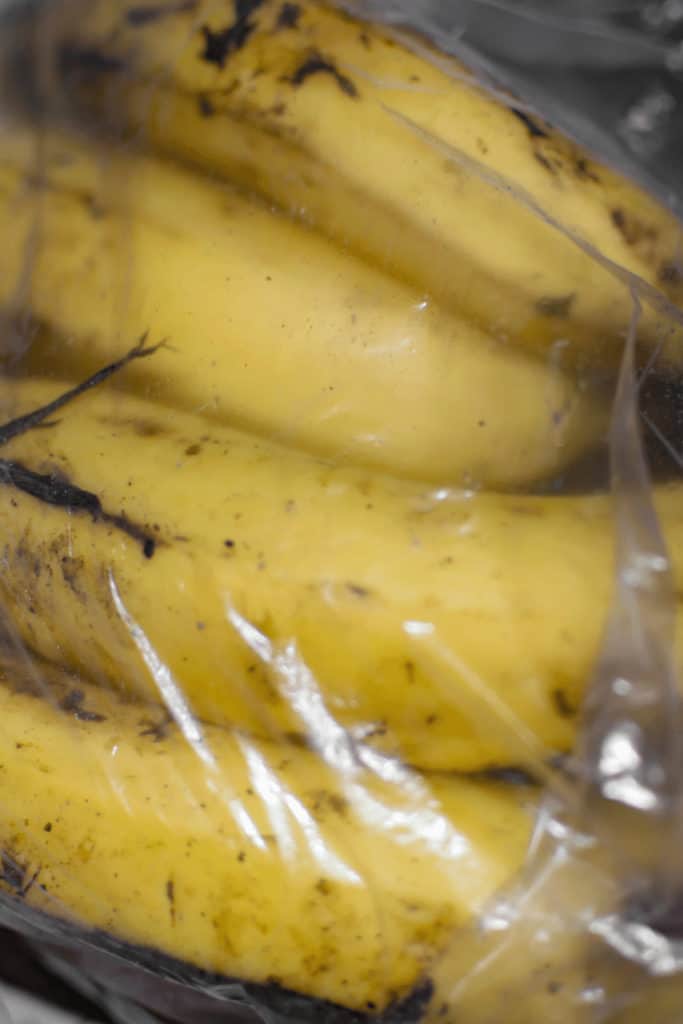
Reason 7: Impatience
Or you may simply be too impatient, wanting your delicious bananas now.
It takes five to seven days for green bananas to ripen, and even then, they may need a few extra days if they were kept in a cold place or suffocated for a day before you removed the packet you bought them in.
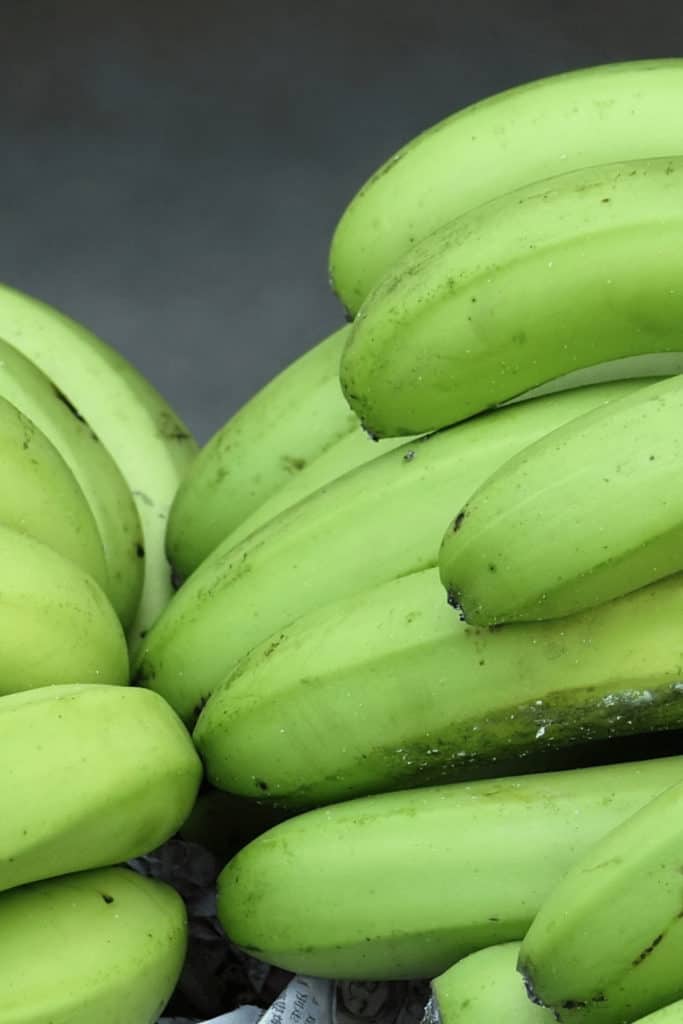
Frequently Asked Questions About Why Your Bananas Aren’t Ripening
What factors affect banana ripening?
The factors that affect banana ripening are the fruit’s exposure to sunlight, the gaseous plant hormone – ethylene – that determines when the fruit is harvestable and when it’s overripe, water and humidity, storage temperature, when the fruit is mature and harvested, mechanical damage, peel thickness, and biotic stress from diseases and pests.
Can you eat an unripe banana?
You can eat an unripe banana that is green instead of a ripe yellow banana. While a green banana’s taste and texture don’t appeal to everyone, they are ideal snacks for diabetics because they are low in sugar. Unripe bananas help your body absorb calcium better, and they contain probiotic bacteria that promote colon health.
How long does it take for bananas to ripen?
Generally, it takes between a day to five days for a banana to ripen, but it depends on how unripe they are. You can also place your unripe, unpeeled bananas in an oven that’s heated to 300℉ for 15-30 minutes until they are black and soft. Or, place the bananas in a microwave after poking through the skin a few times with a fork for 30 seconds to two minutes, or until they are ripe.
Conclusion About Why Your Bananas Aren’t Ripening
And there you have it.
Quite the range of factors for why your bananas aren’t ripening.
Remember to ensure your bananas aren’t oxygen-deprived or placed in a cold area.
Be patient, and check the variety of bananas you buy.

